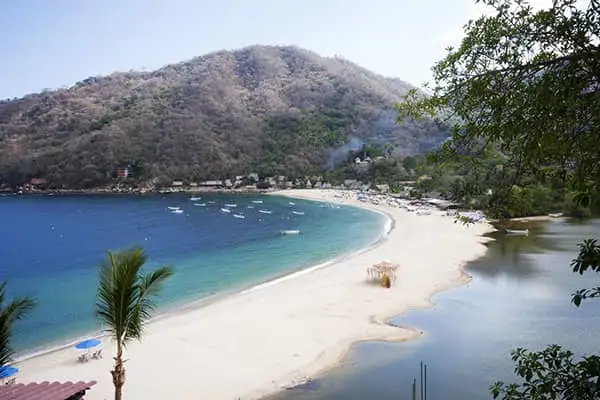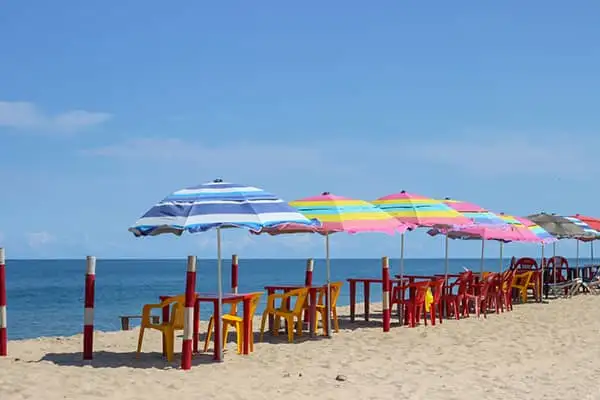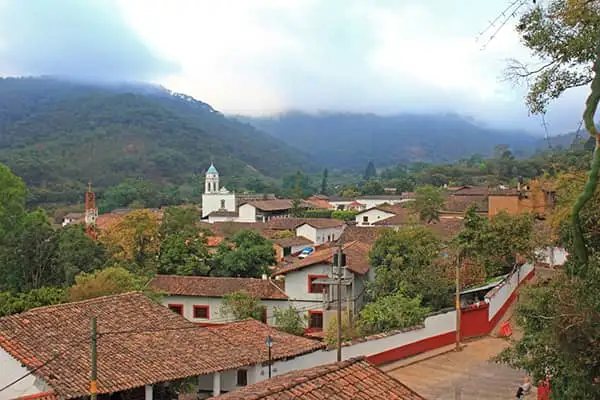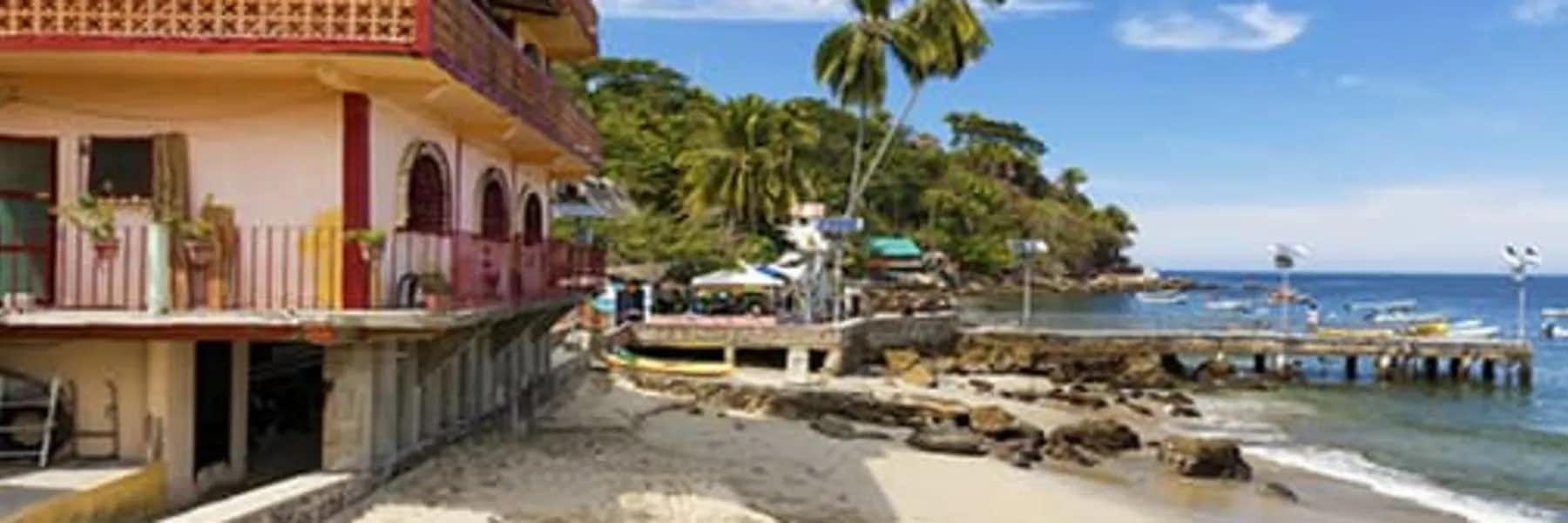Puerto Vallarta! The name conjures up sun and sand, margaritas, and music. Exciting as it is, though, after a few days you may want a break from the intense urban energy. The good news is you don’t have to go far. Here are three towns, two along the coast and one in the hills, all just over an hour away, that will bring your blood pressure down and make you feel very tranquilo.
Yelapa

Formerly a tiny fishing village, Yelapa is now a beach town located in a remote cove about 40 minutes by water taxi from Puerto Vallarta. It’s easily accessible for a day, a weekend, or even all winter—which is how long many visitors from the U.S. and Canada stay, returning, year after year like migrating birds. The community was founded by four indigenous families about 150 years ago and is still owned and maintained by the original residents and their descendants.
It’s the opposite extreme from Vallarta: no roads, no cars (other than a few Quads), no ATMs, no loud music. Instead, you’ll find concrete and dirt paths bordered by tropical jungle vegetation and bright flowers. With its secluded location and absence of cars, Yelapa has an alternative, counterculture feel. A couple of retreat centers in town attract international visitors for yoga, holistic healing, personal transformation, and writing retreats.
Yelapa boasts two waterfalls. The first is a 10-minute walk on a cobblestone lane from the center of town; the second, more secluded, involves a two-and-a-half-mile hike upriver over several easy river crossings, jungle landscapes, private homes, and wild horses. At the end, you clamber over some rocks to reach the waterfall and a natural pool.
For such a small town, Yelapa has a wealth of restaurants, many overlooking the ocean. The town is also famous for its “pie ladies,” local women who sell fresh pies in a variety of flavors on the beach.
To reach Yelapa, go to the southern end of Puerto Vallarta’s malecón (boardwalk) to Playa de Los Muertos, where you’ll see people lining up. Water taxis leave every hour and take 45 minutes to an hour.
Lo de Marcos

Lo de Marcos is a former coconut plantation and now a small, sleepy, family-friendly Mexican town 40 miles north of Puerto Vallarta, with a mile-long uncrowded beach. It has all the amenities of busier larger towns—a colorful plaza, good restaurants, a couple of well-stocked grocery stores, a Saturday food/craft tanguis (market), kayaks and paddleboards to rent, hiking trails, and a lagoon, where I had a dip the first day, before discovering that locals believe a crocodile lurks there. (It’s great for bird watching, though).
Compared to its two neighbors to the south, surfer beaches San Pancho and Sayulita, Lo de Marcos is still relatively undiscovered and not overrun by tourists, although it’s moving in that direction. The town has a number of RV campgrounds, where you’ll see a lot of Canadian license plates. Most people get around on foot, bicycle, or golf cart.
While the beach is lush and beautiful, the ocean becomes deep quickly and in places has a strong riptide, so be careful. Watch where the locals swim, which is usually at the central part of the beach where the currents are gentler.
In addition to beach walking, you can wander along dirt tracks next to the fields of corn on the north side of the creek. If you want something more organized, join locals at 8:00 a.m. at the plaza arch on Mondays and Wednesdays for walks of various lengths. Check out “What’s Up Lo de Marcos” on Facebook, where each hike is posted the day before.
A small secluded beach, Playa Los Venados, lies at the southern end of town, about a 45-minute walk or a 10-minute drive along the road that runs parallel to the beach. Los Venados is great for swimming and snorkeling, and has a restaurant serving fresh fish.
To get to Lo de Marcos from Puerto Vallarta, take the direct bus, or an Uber, which will cost 600 pesos to 800 pesos, or $30 to $40.
San Sebastián del Oeste

For a completely different landscape and climate, head inland from Puerto Vallarta just over an hour into the cloud forest to the pueblo mágico San Sebastián del Oeste (population 700). Formerly a 17th-century mining town, it’s perched high in the Sierra Madre mountains at 4,600’. The two-lane highway to the village winds past old farmhouses, coconut stands, and small distilleries.
With its old colonial church, restored haciendas, and cobblestone streets, San Sebastián is considered one of the most picturesque villages in Mexico. I felt like I was in another century when my husband, Barry, and I joined the local vaqueros in their cowboy hats sitting on the porch of the old historic hotel. We drank raicilla, the spirit cultivated locally from the agave plant, while watching the festivities at the Saturday market below.
One day, we hiked up a gravel road for two hours to reach the lookout at Cerro de la Bufa, which provides views all the way to the Pacific. (If you don’t want to exert yourself, you can rent an ATV in town or sign up for a tour in town). Being cemetery buffs, we had to check out the Panteón Antigua, which sits on top of a volcano and contains tombs and mausoleums of important historical figures.
While hardly a hotspot, the village is becoming trendy, with several boutique hotels and well-reviewed restaurants like Montebello (Italian) and Villa Nogal (French). The restaurant Jardin Nebulosa, which offers local-sourced Mexican cuisine, is so popular that people come from Puerto Vallarta to dine there.
We took the bus from Puerto Vallarta, but because it doesn’t go all the way into town, our Airbnb owner picked us up at the San Sebastian turnoff... Most tourists take a day tour from Puerto Vallarta or drive.
The Takeaway
Coast? Hills? Which will it be? Either way, after a few days in a quiet village, you can always go back to Puerto Vallarta and enjoy the bright lights of the city. But if at any time you feel like a change of pace, it’s good to know that waterfalls, a lagoon, and cool mountain air are all within easy reach.
